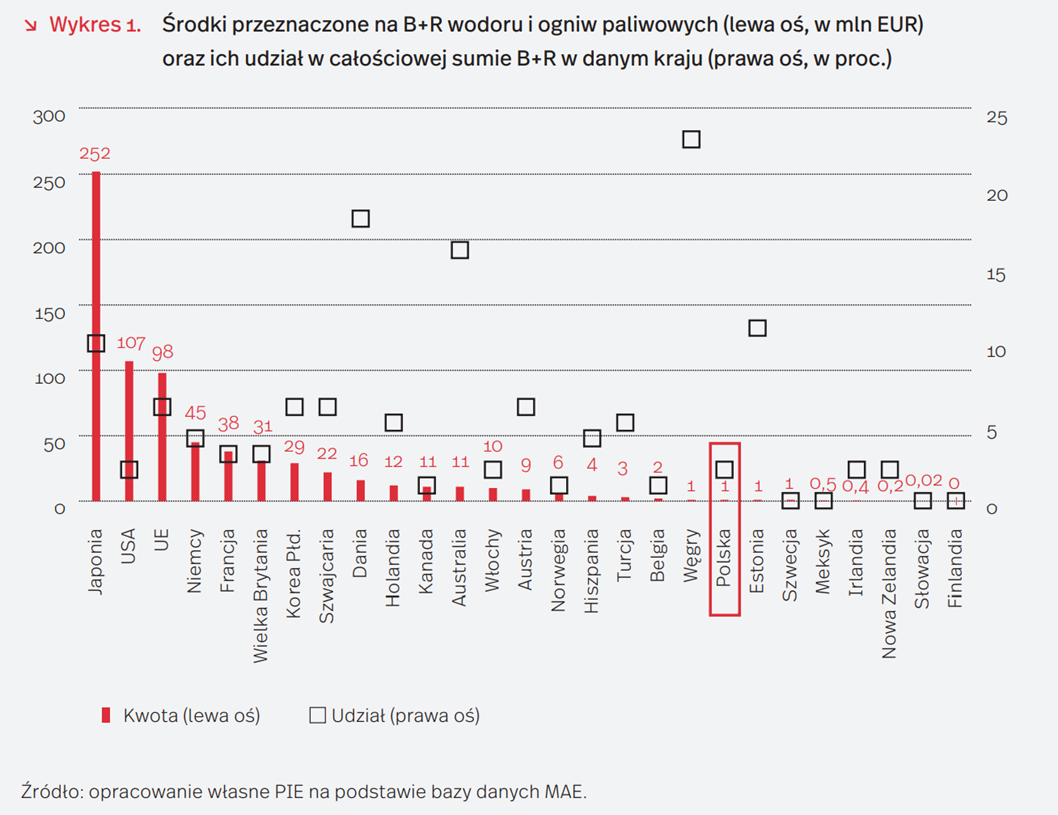The lack of legislation and insufficient R&D expenditure hinder the development of a hydrogen economy in Poland

Published: 21/01/2021
Poland has only just begun to build a hydrogen economy. According to research conducted by the Polish Economic Institute, 67 per cent of industry experts consider the current legislation to be a barrier to its development.
Three-fourths of experts are critical of Poland’s infrastructure potential and resources for extending its stock. The solution should be to rapidly implement a hydrogen strategy to regulate the functioning of stakeholders and to introduce facilitating legal and market-based mechanisms. Those are the conclusions to be drawn from the PEI report entitled Gospodarka wodorowa w Polsce. Obserwacje na podstawie ram badawczych Technologicznego Systemu Innowacji (only available in Polish; the English version of the title: ‘The hydrogen economy in Poland. Observations based on the research framework of the Technological Innovation System’).
Increasing the role of hydrogen in various sectors of the economy may contribute to achieving climate neutrality and reducing dependence on imported fossil fuels. The main advantages of hydrogen as fuel include its potentially zero greenhouse gas emissions as well as inexhaustible resources and a wide range of applications.
The hydrogen economy potential in Poland
Against the background of advanced economies, Poland has relatively limited technological potential for developing a low-carbon hydrogen economy. It follows from an insignificant number of specialised businesses and from data regarding dedicated research and development expenditure. According to the experts participating in the research carried out by the Polish Economic Institute, the fundamental problem in the development of the hydrogen innovation system is the low market maturity (first and foremost, the lack of adequate legislation and support instruments) and insufficient guidance of the search (mostly unclear objectives and objective setting procedures).
‘According to the International Energy Agency, Poland’s research and development spending on hydrogen and fuel cell technologies in nominal terms and as a share of GDP is approx. one-fortieth and one-fifteenth, respectively, of the funds assigned by the EU’s leaders, i.e. Germany and France. It represents 2 per cent of Poland’s total R&D expenditure, a proportion that is not so different from those noted in the above-mentioned countries. It means that Poland allocates significantly lower total amounts to R&D, but similarly less, proportionally, to R&D in hydrogen and fuel cell technologies,’ says Magdalena Maj, an analyst in the energy and climate team of the Polish Economic Institute.
The main participants in the innovation system in Poland include the government administration, State-owned companies and State-funded supporting organisations. The building of a hydrogen economy is based on a top-down approach, i.e. the initiation and implementation of public policy at the central level. On the plus side, the approach can ensure better synergy between measures taken by major system players and provide greater financial leverage for the implementation of hydrogen projects due to capital accumulation. Its drawbacks include significant pressure from certain system participants on maintaining non-prospective assets (based on fossil fuels) and information asymmetry between State-owned companies and private undertakings.
‘The encumbrance of State-owned fuel and energy companies involved in the development of a hydrogen economy with “dirty assets”, based on the use of fossil fuels, will reduce their spending on “green innovation”. As a result, the gap between Poland and the world’s leaders may widen rather than narrow. At the same time, the privileged access of State-owned companies to knowledge and greater influence on areas such as regulations and support instruments may disrupt market mechanisms and undermine the competitiveness of private firms, contrary to the overarching goal of building the position of Polish businesses in international supply chains of the hydrogen economy,’ said Aleksander Szpor, the head of the climate and energy team of the Polish Economic Institute.
Recommendations for the future
As indicated by the results of the structural and functional analysis and by foreign experiences, the rapid adoption of Poland’s hydrogen strategy may foster the development of the Polish hydrogen economy. It would facilitate the coordination of measures taken by the hydrogen economy stakeholders and ensure stable investment conditions.
‘A particularly important issue in the Polish hydrogen strategy will be the provision of information flow between the public administration, State-owned companies and Polish firms likely to build supply chains of the hydrogen economy. It would reduce the problem of information asymmetry and protect the current development model from State-owned companies’ gaining market advantage at the expense of other Polish undertakings,’ comments Aleksander Szpor, the head of the climate and energy team of the Polish Economic Institute.
The study conducted by the PEI also suggests that it is recommended to design appropriate market support mechanisms for the hydrogen economy, e.g. carbon contracts for difference, FIT (Feed-In Tariff), FIP (Feed-In Premium) or feebate solutions, as well as excluding or limiting public support for projects solely based on the production of ‘grey’ (‘brown’) hydrogen. It would facilitate reducing the costs of public intervention necessary for hydrogen technologies (developed with the participation of Polish firms) to achieve market maturity and avoiding the risk of carbon lock-in.
The Polish Economic Institute is a public economic think-tank dating back to 1928. Its research spans trade, macroeconomics, energy and the digital economy, with strategic analysis on key areas of social and public life in Poland. The Institute provides analysis and expertise for the implementation of the Strategy for Responsible Development and helps popularise Polish economic and social research in the country and abroad.
Media contact:
Ewa Balicka-Sawiak
Press Spokesperson
T: +48 727 427 918
Kategoria: Climate and Energy / Press releases / Report / Reports 2021






